Ever wanted to know what goes into your bottle of Uptime Energy Drink?
Look no further, as this handy article will guide you through all the ins and outs of the ingredients in Uptime Energy.
A regular 12 fl.oz bottle of Uptime Energy has 150 calories, 37g of cane sugar, and 142mg of caffeine, along with some Vitamin C and Calcium. 142 mg is well below the 400 mg daily threshold prescribed by the FDA, so you won’t need to worry about the caffeine content.
For a more in-depth look, stick arounf to find out everything you need to know about Uptime Energy drink’s caffeine and ingredients and understand exactly how each piece of the puzzle may affect you.
Let’s get started…
Uptime Energy Nutrition Facts
Here’s the nutritional value of Uptime Energy drink, all in an easy-to-read table:
| Value (Standard Serving) | Uptime Cane Sugar (12 fl.oz) | Uptime Sugar-Free (12 fl.oz) |
| Energy | 150 Calories | 5 Calories |
| Protein | 0g | 0g |
| Carbohydrate (Of which Sugars) | 38g (37g) | 1g (0g) |
| Sodium | 0g | 0g |
| Caffeine | 142mg | 142mg |
| Vitamin C | 9mg | 9mg |
| Calcium | 115mg | 115mg |
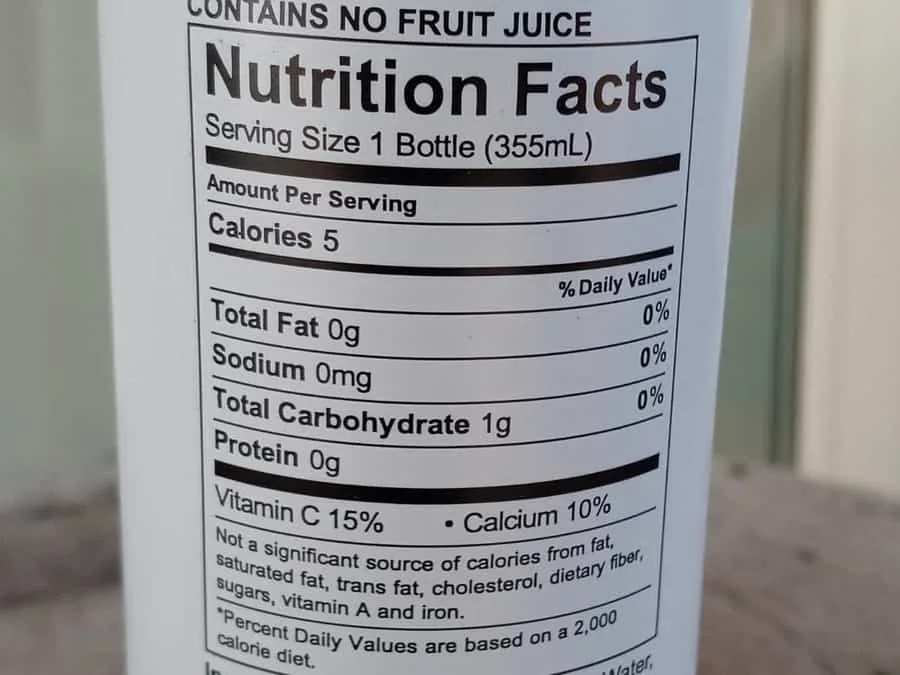
Uptime Energy Drink Ingredients
Here’s everything that goes into an Uptime Energy Drink, which you can find printed on the back of a bottle.
The only noticeable difference between the Original and Sugar-Free version of Uptime is the replacement of cane sugar with sucralose. Apart from that, they’re really quite similar.
Uptime Original Sugar-Cane
- Filtered Carbonated Water
- Cane Sugar
- Citric Acid
- Natural Flavors
- Calcium Citrate
- Natural Caffeine
- Potassium Benzoate (Preservative)
- Potassium Sorbate (Preservative)
- L-Theanine
- Panax Ginseng Root Extract
- Angelica Root Extract
- Ascorbic Acid
- Coenzyme Q10
Uptime Sugar-Free
- Filtered Carbonated Water
- Citric Acid
- Natural Flavors
- Calcium Citrate
- Natural Caffeine
- Potassium Benzoate (Preservative)
- Potassium Sorbate (Preservative)
- Sucralose
- L-Theanine
- Panax Ginseng Root Extract
- Angelica Root Extract
- Ascorbic Acid
- Coenzyme Q10
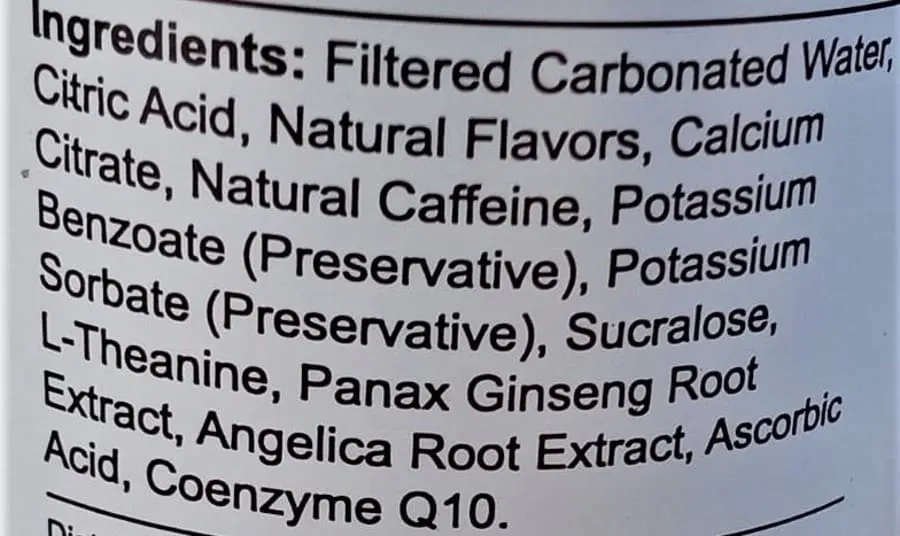
Uptime Energy Caffeine Content
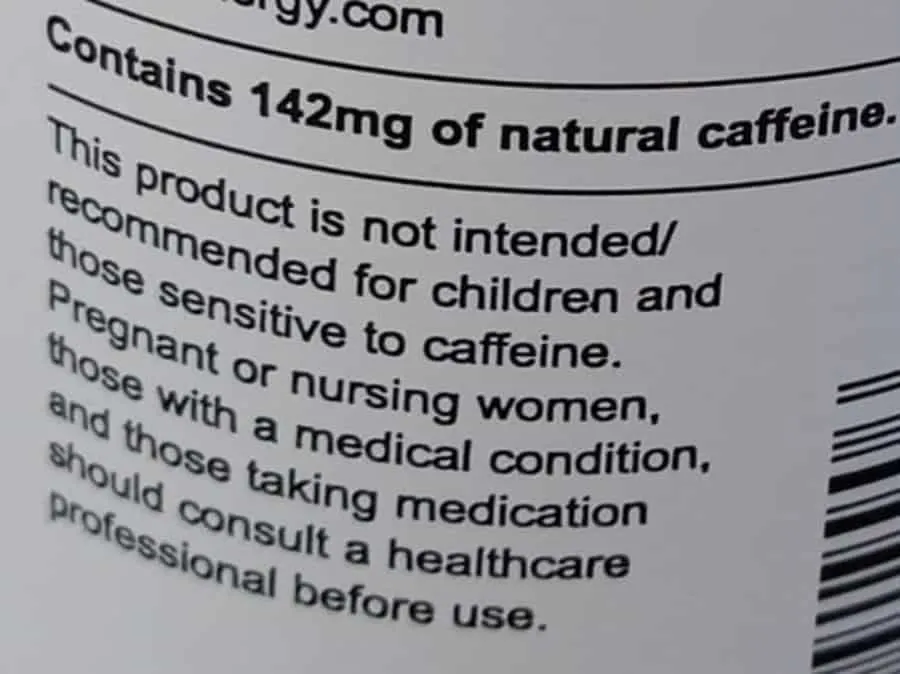
Each 12 fl. oz bottle of Uptime Energy has 142mg of caffeine.
142mg of caffeine per 12 fl.oz is pretty average for an energy drink and isn’t that different from either a 16 fl.oz can of Monster or Rockstar (both of which contain 160mg of caffeine).
I personally prefer to have between 50 to 100mg of caffeine per serving, which I find is just the right amount to give me a nice energy boost, but not so much that I might get a headache or feel flush from it.
With 142mg of caffeine, Uptime doesn’t have that much more caffeine than what I would usually go for, so it should be alright even if you happen to be caffeine-sensitive.
Of course, that all depends on your caffeine metabolism and how often you consume caffeinated beverages, so your mileage might vary.
As a quick reminder, the FDA approves a caffeine intake limit of no more than 400mg per day. Any more than that might lead to side effects such as:
- Insomnia
- Restlessness
- Headaches
- Stomachaches
- Dizziness
- Dehydration
- Anxiety
As with all caffeinated beverages, be sure to not have too many bottles of Uptime Energy in a single day. Aside from that, try not to double down with other caffeinated beverages such as coffee, tea, or soda – all of which also contain caffeine.
What type of caffeine is in Uptime?
Uptime energy drink contains only natural caffeine. This is caffeine that was extracted from plant sources such as cocoa beans, coffee beans and tea leaves.
Each 12 oz bottle of Uptime contains 142mg of caffeine. This amount of caffeine is fairly average at this size so anyone who is sensitive to their caffeine intake will find this drink a good choice.
The caffeine in Uptime is not necessarily a large amount given the 400mg a day recommendation. It is best however to still minimize your consumption to one bottle a day as the drink contains high amounts of sugar at 37g.
Uptime Energy Sugar Content
A 12 fl. oz bottle of Uptime Energy has 37g of sugar derived from cane sugar.
While the cane sugar present in Uptime Energy Drinks might sound healthier, the end product still ends up being regular sucrose (aka regular sugar):
Just like regular sugar, raw cane sugar is made up of sucrose and can contribute to weight gain and disease if consumed in excess.
Healthline
So, cane sugar isn’t necessarily a healthier substitute for regular sugar, as its nutritional impact on your body is the same as that of regular sugar.
Back on the topic of added sugar, the AHA recommends a maximum daily added sugar intake of 25g for women and 36g for men.
Considering that an Original Bottle of Uptime Energy has 37g of sugar, it definitely has a bit more than what anyone should be having in a single day.
That said, sugar isn’t always a bad thing. In fact, having a tiny bit of sugar can provide a small boost in energy and mood.
It’s only when you start consistently having too much sugar that it might lead to some pretty nasty health issues further down the road, such as:
- Weight Gain
- Type II Diabetes
- Increased risk of heart disease
- Acne
- Increased risk of depression
Too much sugar in a short period of time can also lead to a dreaded sugar crash, so it’s best not to have too many bottles of Uptime Energy in a short time either.
If you want to avoid the hassle of dealing with sugar, try the Sugar-Free version of Uptime Energy instead, or perhaps try some of the alternatives I’ve listed in my best zero-calorie energy drinks article.
Does Uptime Energy Have Artificial Sweeteners?
While the Original Uptime doesn’t contain any artificial sweeteners, the sugar-free version contains sucralose, which is a zero-calorie artificial sweetener.
While Uptime Sugar-Free is the healthier version of Uptime, it still has artificial sweeteners, which, although not actively detrimental to your health, still have some notable concerns over its long-term use.
While artificial sweeteners have been approved by health authorities, going for a drink with lower sugar content or naturally sweetened might be the healthier choice in the long run,
If you’re looking for an energy drink with lower sugar content, take a look at the comprehensive article I’ve written on the best energy drinks with less sugar. You’ll definitely find it interesting.
Other Ingredients
A deeper dive into the other ingredients present in Uptime Energy Drinks, minus the obvious ones (such as the preservatives).
Calcium Citrate
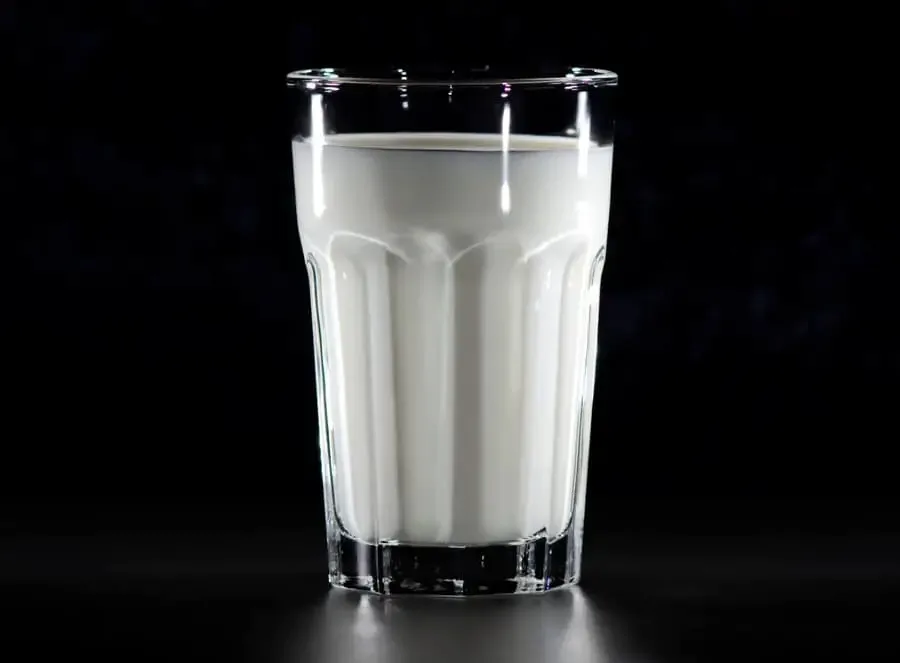
Calcium Citrate is the main source of calcium found in Uptime Energy Drink, which acts as a food additive, preservative, and flavor modifier.
Each 12 fl. oz serving of Uptime Energy gives you about 115mg of Calcium, or 10% of your recommended daily intake, which is a fairly decent amount.
While you may not consider adding extra calcium into your diet, especially if you happen to be a young adult, there are some benefits of additional calcium, such as:
- Reducing cholesterol levels
- Reducing blood pressure
- Preventing tooth loss
- Indigestion
Of course, that’s not to say you’re definitely getting any benefits of calcium from Uptime Energy. Effective dosages of calcium range from 0.4 to 2g, so it’s hard to say that the 115mg present in Uptime will have much of an impact.
L-Theanine
L-Theanine is an amino acid that’s most commonly sourced from green and black tea leaves.
It can be helpful in assisting memory and thinking skills, as well as in providing relief from anxiety and stress.
It may also induce a state of relaxation, although it seems debatable if you’ll end up feeling relaxed after having an energy drink.
Panax Ginseng Root Extract
Ginseng is a natural herb that’s often used in food and remedies and is often found in energy drinks (notably REIZE).
It has a bunch of potential benefits such as:
- Increased energy
- Sharper cognitive function
- Anti-inflammatory effects
- Lowering blood sugar
Apart from some rare cases where it interacts with certain drugs, ginseng is perfectly safe for general consumption, so you really shouldn’t worry too much about it.
For more information on ginseng and how it may be a good ingredient to have in your energy drink, take a look at the article I’ve written all about ginseng.
Angelica Root Extract
Angelica Root Extract is one of the more fringe energy drink ingredients in the market, which supposedly helps with reducing intestinal gas.
That said, there’s not much scientific data on how Angelica Root may actually benefit you.
In any case, it seems like a relatively harmless ingredient and does make the drink sound a little bit healthier.
Ascorbic Acid
Ascorbic Acid, more commonly known as Vitamin C, is a natural water-soluble vitamin, which functions mainly as an antioxidant, fighting against bacteria while detoxing the body.
If you’ve ever had a fruit, you’ve had ascorbic acid. Vitamin C is a pretty essential nutrient for you to have, as it helps prevent immune deficiencies, cardiovascular diseases, and even skin wrinkling.
As for how much Vitamin C you should have a day, health experts place it at around 75 to 90mg per day.
As Uptime Energy only has around 9mg of Vitamin C per bottle, you’re probably not going to get enough of it from Uptime alone.
Still, it doesn’t hurt to have a little Vitamin C present in Uptime, so it’s a pretty great addition to an energy drink in my opinion.
Coenzyme Q10
CoQ10 is a naturally produced antioxidant that your cells use for growth and maintenance, and also for generating energy in your cells.
As for its benefits, CoQ10 may help with relieving the oxidative stress that muscles go through during high-intensity exercise, which sounds pretty good to me.
Despite the possible benefits, we don’t actually know how much CoQ10 is actually in Uptime Energy, so it’s best to take the potential benefits with a pinch of salt.
Uptime VS Other Energy Drink Brands
A comparison of Uptime against Celsius and Monster, to see how it fares against some more prominent brands.
| Celsius (12 fl. oz) | Uptime Original (12 fl. oz) | Monster (16 fl. oz) | Monster (16 fl.oz) | Daily Max Limit (Female/Male) | |
| Calories | 150 calories | 5 calories | 10 Calories | 240 Calories | 2400 calories/3000 calories |
| Sugar | 37g | 0g | 0g | 39g | 25g/36g |
| Caffeine | 142mg | 142mg | 200mg | 160mg | 400mg |
As you can see from the table above, although Uptime has fewer calories than the more sugary energy drinks, it really can’t compete with some of the zero-calorie energy drinks in the market.
Of course, at some point, you’re definitely trading taste for health, but I feel that Uptime manages to slide into a sweet spot of having an acceptable amount of sugar and caffeine without going overboard.
Now if only something could be done about Uptime’s rather high price.
Is Uptime A Good Energy Drink?
All-in-all, I think Uptime is a perfectly suitable energy drink for your energy-boosting needs, even if the ingredients list isn’t all that extensive and the price is a bit expensive.
While it doesn’t have all the good old B-Vitamins we often associate with energy drinks, it does contain some rather interesting ingredients that aren’t very common in energy drinks, such as Ascorbic Acid and Calcium.
All-in-all, Uptime is a pretty basic energy drink that won’t really blow your socks off. But, it does taste pretty good, and if you can stomach its high price, Uptime might be an amazing treat every now and then.
Uptime Energy Drink Flavors
The Sugar Cane version of Uptime Energy has 3 flavors, while the sugar-free version has 5.
In terms of variety, Uptime only has a small selection of flavors, so if you’re not into fruity flavors, or have a very specific preference, Uptime may not be very exciting for your tastebuds.
On the bright side, Uptime tastes pretty awesome in my opinion. You can read more of my full thoughts on the drink in my review of Uptime Energy here.
Original Sugar-Cane
- Original Citrus
- Blood Orange
- White Peach Lemonade
Sugar-Free
- Original Citrus
- Blood Orange
- White Peach Lemonade
- Mango Pineapple
- Blueberry Pomegranate
Uptime Energy Alternatives
Uptime is a good energy drink, no doubt. But, here’s a list of some great alternatives to Uptime if you’re keen to explore the wide world of energy drinks.
- Celsius
- Bang
- Red Bull
- Rockstar
- Reign
- Guru
- Rockstar
- Xtend
- Mountain Dew Kickstart
- AMP Energy
- 3D Energy
- Monster
- Adrenaline Shoc
- Raze Energy
- Full Throttle
- NOS Energy
While you’re at it, why not have a look at powdered energy drinks? They’re usually more cost-effective, plus you can adjust the formula to what best suits you:
REIZE (10 out of 10)
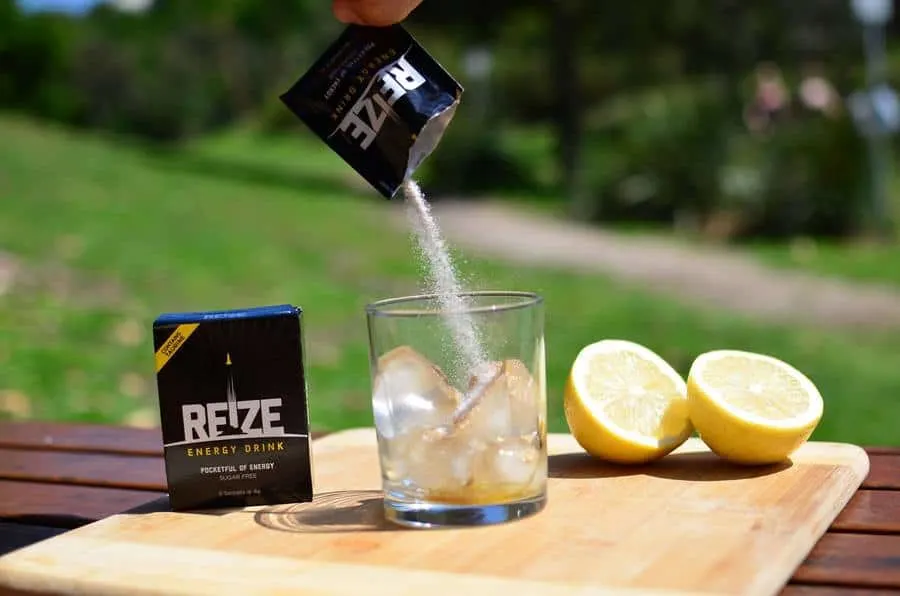
If you’re not too keen on Uptime, how about an energy drink that’s sure to give you a nice boost without the high price?
REIZE is a great powdered energy drink that comes in a convenient 4g sachet. With a sensible 50mg of caffeine, REIZE is completely sugar-free and has only 11 calories per serving.
REIZE also contains a smart blend of taurine, ginseng, and B-group vitamins. It’s the ideal mix, giving you the perfect energy boost, without the crash.
The best part?
REIZE ships straight to your door for only about $1 per drink.
That’s definitely great value for money.
Try REIZE today and I’m sure you’ll agree that it’s a smarter choice than Uptime Energy Drink.

